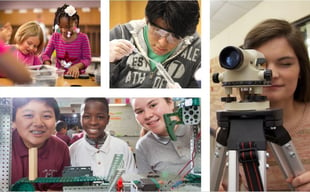This PLTW Blog entry is an excerpt from the PLTW Fundraising Toolkit. You can download the full toolkit here.
Fundraising is a collaborative process that leads to partnerships that go beyond monetary support. Below, we’ve outlined those who you should consider bringing to your fundraising table.
1. District and School Leadership
Having PLTW champions within your district and/or school leadership will help ensure your program has the support and resources it needs to reach its full potential. Support from leadership is also key to connecting the program to the rest of the school, community, local business and industry, and economy – a vital aspect of program sustainability. In addition, you may need to seek fundraising approval from other stakeholders like the school board, superintendent, or CTE director.
2. Teachers
When it comes to fundraising for your PLTW programs, teachers are one of your most invaluable resources. As facilitators, content experts, and champions, their expertise and support is critical not only to help fundraise, but also to build a sustainable program. For new implementations, teachers can help determine which supplies and equipment they already have and which will need to be purchased. If you have an active PLTW program, teachers can provide input around additional classroom needs. They also can help provide compelling stories of how PLTW will help or has helped students in their classrooms.
3. PTO and/or Educational Foundation
If your school district has an active PTO or education foundation, consider engaging them from the very beginning. Doing so can result in growing the number of advocates and fundraising volunteers for your PLTW programs. In some cases, the education foundation might even be the best group to lead your PLTW fundraising efforts.
4. IT Team
Another group of people you might consider including is your IT team. Your IT staff can provide insight into your school’s technology capabilities, as well as identify technology needs. They will be helpful in building an inventory of necessary technology equipment, supplies, and any infrastructure changes, which can then help you build a budget.
5. Other PLTW Advocates
Depending on whether you are just starting a PLTW program, or have a well-established program, this list of stakeholders may vary considerably. The most important types of people to include as external PLTW advocates are those who are enthusiastic and committed to helping build a strong PLTW program. Groups and individuals to consider engaging:
- Businesses and industries within the community
- Economic and workforce development organizations and boards
- Rotary, Lions, and Kiwanis clubs and other community organizations
- Chambers of commerce
- College deans' offices or outreach coordinators for staff and faculty support
- College alumni coordinators
- Parents of students
- Students and former students


